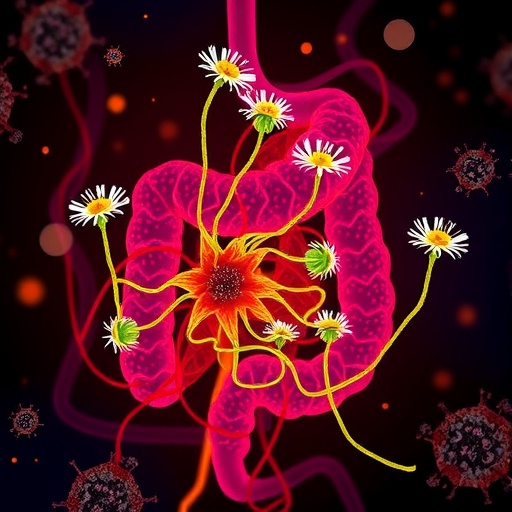In recent years, the therapeutic potential of traditional herbal remedies has become a focal point in gastrointestinal research. A new study published in BMC Complementary Medicine and Therapies has provided promising insights into the efficacy of Modified Pulsatilla decoction in alleviating colitis induced by dextran sulfate sodium (DSS) in mice. This research not only sheds light on the significant effects of this herbal treatment but also opens doors for advancements in how we approach inflammatory bowel diseases (IBD).
Inflammatory bowel disease, particularly ulcerative colitis, is a chronic condition characterized by inflammation of the gastrointestinal tract. This illness drastically affects the quality of life for millions globally. Current therapies, although effective for many, do not work for everyone and can come with undesirable side effects. Therefore, there’s a pressing need for alternative treatments that can complement existing therapies and minimize adverse reactions.
The study conducted by Hu, Liu, and Chen et al. meticulously investigated how Modified Pulsatilla decoction influenced the gut microbiota of mice subjected to DSS-induced colitis. The traditional decoction utilizes various natural ingredients renowned for their anti-inflammatory properties, making this a fascinating subject of study in contemporary medical science. By enhancing our understanding of the interactions between herbal treatments and gut microbiota, this research could pave the way for novel therapeutic strategies.
The research team’s approach began with the induction of colitis in mice through DSS, a common method employed to mimic human ulcerative colitis conditions. Following induction, the mice were treated with Modified Pulsatilla decoction over a specific period. The researchers then meticulously documented changes in the severity of colitis, assessing parameters such as weight loss, fecal blood, and colon length as indicators of condition improvement.
Results indicated that mice treated with the Modified Pulsatilla decoction showcased significantly reduced colitis symptoms compared to the control group. This included less severe weight loss and improved colon length measurements, suggesting a marked alleviation of inflammation and damage within the colon walls. These findings strongly suggest that Pulsatilla may possess properties that can help control the inflammatory process associated with colitis.
Moreover, the analysis extended beyond mere observational data. The researchers employed advanced techniques like 16S rRNA sequencing to elucidate changes in the gut microbiome caused by the decoction. The results revealed a marked alteration in the composition of gut microbiota, which is critical since emerging evidence points towards the role of gut bacteria in both the onset and progression of colitis.
The study also highlighted an increase in the expression of two key cytokines, IL-10 and IL-22, in the treatment group. These cytokines are known for their regulatory roles in the immune response and their protective effects on the intestinal barrier. IL-10 is particularly significant as it possesses anti-inflammatory properties that mitigate excessive immune responses, thus potentially contributing to the healing process in inflamed tissues.
The implications of these findings are profound, as they reinforce the concept that herbal treatments might not only help alleviate symptoms of colitis but also encourage a healthier microbiome—an aspect that current pharmacological treatments often overlook. The modulation of gut microbiota presents an opportunity to engage in a more holistic approach when treating such complex diseases, providing a combination of symptom relief while encouraging an enhanced microbial balance.
In addition to the immediate effects on colitis symptoms and gut bacteria, the study raises critical questions regarding the mechanisms behind these therapeutic actions. How exactly does Modified Pulsatilla decoction alter the gut microbiome, and which specific compounds within the decoction are responsible for its anti-inflammatory effects? These questions invite further exploration and necessitate deeper studies into the biochemistry associated with traditional herbal medicines.
With the rising interest in gut health and its relationship to systemic conditions, public awareness regarding the microbiome’s role in diseases is also increasing. This study could serve as a catalyst for further research into natural treatments, encouraging scientists and clinicians to rethink existing paradigms. The potentially transformative nature of integrating traditional herbal remedies into modern medicine could not only enhance patient outcomes but also foster a more personalized approach to treatment.
In conclusion, the research by Hu and colleagues significantly contributes to the growing body of evidence supporting the use of herbal remedies in treating inflammatory bowel diseases. The manifestations observed in DSS-induced colitis models elucidate several pathways through which Modified Pulsatilla decoction operates. As this field continues to evolve, collaboration between traditional knowledge and modern science will be crucial in harnessing the full potential of natural therapies.
Continued research is essential to validate these findings and to translate them into clinical settings. Future studies should aim to identify the active components of the Modified Pulsatilla decoction and their specific interactions within the gut microbiota. Such endeavors will not only enlighten us on the intricate dynamics of colitis treatment but may also expand our understanding of other gastrointestinal disorders, propelling us toward more comprehensive and effective caregiving strategies for patients worldwide.
Subject of Research: Efficacy of Modified Pulsatilla decoction in treating DSS-induced colitis in mice.
Article Title: Modified Pulsatilla decoction alleviates DSS-induced colitis in mice by modulating gut microbiota and promoting IL-10 and IL-22 expression.
Article References: Hu, C.TY., Liu, JY., Chen, HY. et al. Modified Pulsatilla decoction alleviates DSS-induced colitis in mice by modulating gut microbiota and promoting IL-10 and IL-22 expression. BMC Complement Med Ther 25, 435 (2025). https://doi.org/10.1186/s12906-025-05173-6
Image Credits: AI Generated
DOI: https://doi.org/10.1186/s12906-025-05173-6
Keywords: Pulsatilla decoction, inflammatory bowel disease, DSS-induced colitis, gut microbiota, IL-10, IL-22, herbal medicine, cytokines, anti-inflammatory.
Tags: advancements in colitis treatment strategiesalternative treatments for ulcerative colitisanti-inflammatory properties of herbal medicinechronic inflammatory bowel diseasescomplementary medicine in gastrointestinal disordersgastrointestinal tract healthgut microbiota and inflammationModified Pulsatilla efficacy studymouse model for colitis researchPulsatilla decoction for colitistherapeutic potential of herbal treatmentstraditional herbal remedies for IBD





